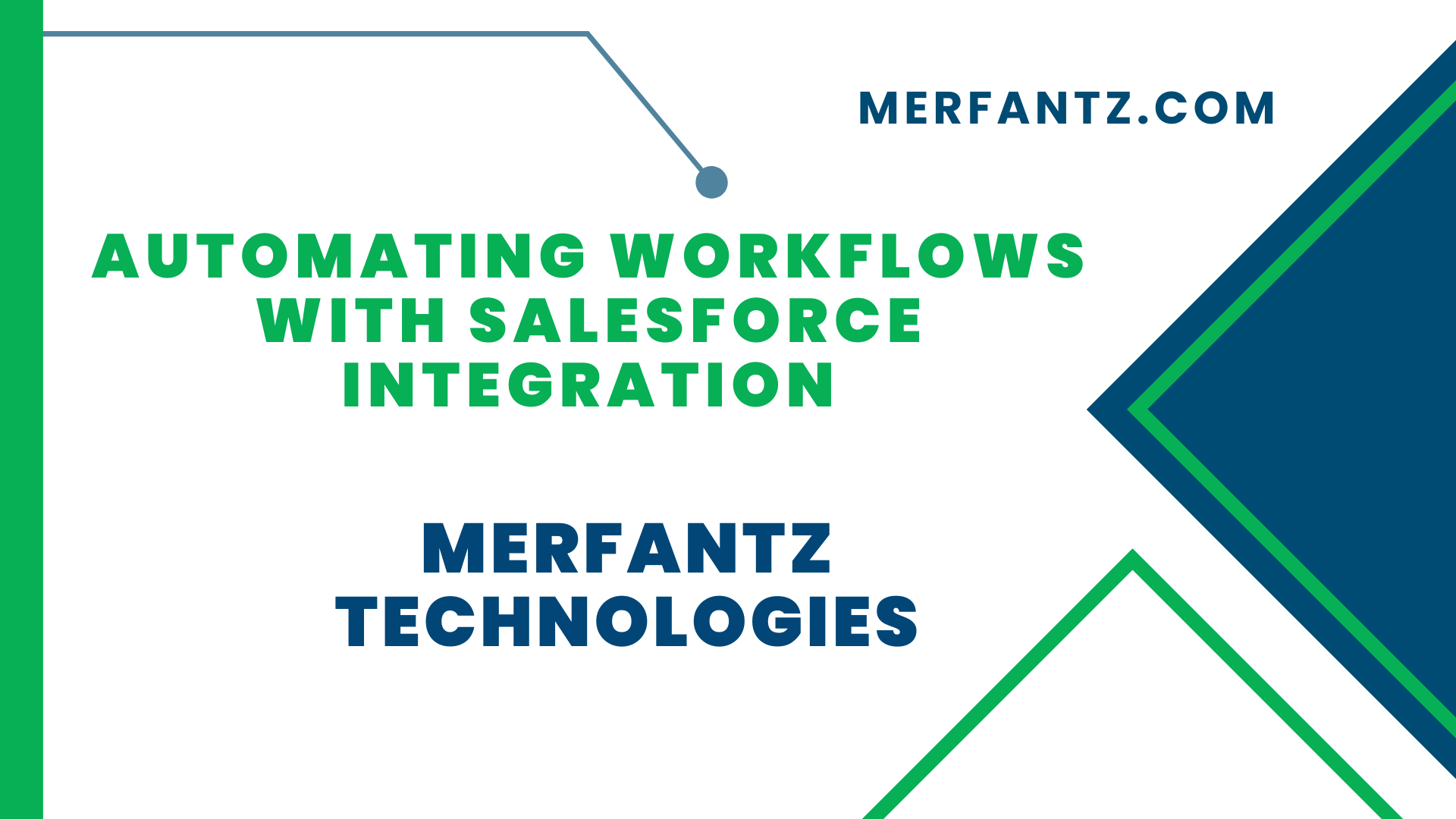The Power of Salesforce Integration for Workflow Automation
Salesforce integration is a game-changer when it comes to automating workflows and streamlining business processes. By seamlessly connecting Salesforce with other tools and systems, companies can unlock the full potential of their data and optimize their operations. Salesforce integration allows for the smooth transfer of information, eliminating manual data entry and reducing the risk of errors. With this powerful integration, businesses gain real-time visibility into their customer interactions, sales pipeline, and marketing efforts, enabling them to make informed decisions and take proactive actions.
Moreover, Salesforce integration empowers organizations to automate repetitive tasks and workflows, saving time and effort for their teams. It enables the automatic synchronization of data across multiple systems, ensuring consistency and accuracy. By automating workflows, businesses can streamline lead management, sales processes, customer support, and more. They can set up triggers, notifications, and approvals, ensuring that tasks are completed efficiently and deadlines are met. With Salesforce integration, companies can achieve increased efficiency, improved collaboration, and enhanced customer experiences.
Benefits of Automating Workflows with Salesforce
Automating workflows with Salesforce integration offers a wide range of benefits for businesses of all sizes. Firstly, it significantly improves productivity by eliminating manual, repetitive tasks, allowing employees to focus on higher-value activities. With automation, companies can accelerate their sales cycles, deliver faster customer service, and reduce response times. These efficiency gains lead to improved customer satisfaction and increased revenue generation.
Furthermore, automating workflows with Salesforce enhances data accuracy and consistency. Manual data entry is prone to errors, but with integration, data is seamlessly synced across systems, reducing the risk of discrepancies. This ensures that teams have access to up-to-date, reliable information for better decision-making. By leveraging automation, businesses can also enforce standardized processes, ensuring compliance with regulations and reducing the likelihood of human errors.
How to Successfully Implement Salesforce Integration for Workflow Automation
Implementing Salesforce integration for workflow automation requires careful planning and execution. The first step is to assess the organization’s needs and identify the workflows that would benefit the most from automation. It’s essential to collaborate with key stakeholders, including sales, marketing, and IT teams, to understand their requirements and gather input. This collaborative approach ensures that the integration solution aligns with the company’s goals and supports its unique processes.
Once the workflows are identified, the next step is to select the appropriate integration tools or platforms. There are various options available, ranging from pre-built connectors to custom integration solutions. It’s crucial to evaluate the capabilities, scalability, and ease of use of these tools, keeping in mind the specific integration requirements. Engaging a reputable Salesforce integration partner like Merfantz Technologies can provide valuable expertise and guidance throughout the implementation process.
Key Considerations for Seamless Workflow Automation
When implementing Salesforce integration for workflow automation, there are several key considerations to keep in mind. First and foremost, it’s crucial to define clear objectives and goals for the automation initiative. This will help guide the selection of the right workflows to automate and ensure that the integration aligns with the overall business strategy. Additionally, it’s important to assess the existing systems and processes to identify any potential bottlenecks or dependencies that may impact the integration.
Data security and privacy should also be a top priority. Ensure that the integration solution adheres to industry best practices and compliance standards to protect sensitive customer information. Scalability is another critical consideration. As your business grows, the integration should be able to handle increasing data volumes and accommodate additional workflows seamlessly. Lastly, it’s essential to provide proper training and change management support to employees who will be using the automated workflows to ensure successful adoption.
Best Practices for Automating Workflows with Salesforce
To maximize the benefits of Salesforce integration for workflow automation, following best practices is key. Start by documenting your existing workflows and identifying areas where automation can bring the most value. Simplify and streamline processes before integrating them to avoid automating unnecessary complexity. It’s also crucial to thoroughly test the integration before deploying it in a live environment to ensure that data flows correctly and that all triggers and notifications work as intended.
Communication and collaboration between different teams are vital during the integration process. Involve stakeholders from sales, marketing, customer support, and IT departments to gather their insights and ensure that the automated workflows meet their needs. Regularly monitor and measure the performance of the integrated workflows to identify any areas for improvement and make necessary adjustments. By following these best practices, you can achieve optimized workflow automation with Salesforce.
Leveraging Salesforce’s Workflow Automation Features
Salesforce offers a range of powerful workflow automation features that can be leveraged to streamline business processes. With Salesforce’s Process Builder, you can visually design and automate workflows by defining criteria, actions, and approvals. Workflows can be triggered based on specific events or conditions, such as record changes or time-based actions. Additionally, Salesforce’s Flow Builder allows for more complex automation, enabling the creation of custom processes with conditional logic, data manipulation, and integrations with external systems.
Salesforce also provides the Lightning Flow platform, which offers advanced automation capabilities and facilitates seamless integration with other applications. Lightning Flow allows for the creation of guided user experiences, such as interactive forms and wizards, to enhance the efficiency and user-friendliness of workflows. By harnessing these powerful automation features within Salesforce, businesses can optimize their processes and drive greater productivity and effectiveness.
Case Studies: Real-world Examples of Successful Workflow Automation with Salesforce
Real-world case studies demonstrate the tangible benefits of workflow automation with Salesforce integration. For instance, One Company, a multinational manufacturing company, automated their lead qualification process using Salesforce integration. By implementing automated lead scoring and routing, they reduced response times and increased conversion rates. This resulted in significant revenue growth and improved overall sales team efficiency.
Another example is Another Company, a customer support-focused organization. They integrated Salesforce with their helpdesk system, automating the creation of support cases from incoming customer inquiries. This streamlined their support processes, reduced manual data entry, and enhanced customer satisfaction by ensuring timely and accurate responses. By leveraging Salesforce integration for workflow automation, they achieved higher customer retention rates and improved service levels.
Overcoming Challenges in Salesforce Integration for Workflow Automation
While Salesforce integration for workflow automation offers numerous benefits, there can be challenges along the way. One common challenge is data mapping and transformation. Integrating data from different systems often requires mapping fields and ensuring data compatibility. It’s important to carefully plan and map the data flow to ensure accurate and consistent information transfer.
Another challenge is managing complex workflows and dependencies. Some workflows may have intricate logic and dependencies that need to be accounted for during integration. Thoroughly understanding and documenting these dependencies is essential to ensure smooth automation and avoid potential issues or errors. Engaging an experienced integration partner, like Merfantz Technologies, can help navigate these challenges and ensure a successful implementation.
Enhancing Productivity and Efficiency with Salesforce Integration
Salesforce integration for workflow automation significantly enhances productivity and efficiency within organizations. By automating manual and repetitive tasks, employees can focus on value-added activities, such as nurturing customer relationships and driving strategic initiatives. The streamlined workflows enable faster response times, quicker decision-making, and improved collaboration among teams.
Furthermore, the integration of Salesforce with other business systems eliminates data silos and provides a centralized view of information. This empowers employees with real-time access to accurate data, enabling them to make informed decisions and take proactive actions. The resulting efficiency gains translate into improved productivity, reduced operational costs, and better overall business outcomes.
Partnering with Merfantz Technologies for Seamless Salesforce Integration
When it comes to Salesforce integration for workflow automation, partnering with a trusted and experienced provider like Merfantz Technologies is crucial. With our deep expertise in Salesforce integration and workflow automation, we can help businesses seamlessly connect Salesforce with other systems and streamline their processes. Our team of experts will work closely with you to understand your unique requirements, design customized solutions, and ensure a successful implementation.
At Merfantz Technologies, we offer end-to-end integration services, from initial consultation and solution design to implementation, testing, and ongoing support. Our focus is on delivering solutions that align with your business objectives, enhance productivity, and drive growth. With our proven track record and commitment to excellence, you can trust us to navigate the complexities of Salesforce integration and unlock the full potential of workflow automation.
FAQ (Frequently Asked Questions) about Automating Workflows with Salesforce Integration:
What is Salesforce integration?
Salesforce integration refers to the process of connecting Salesforce, a leading customer relationship management (CRM) platform, with other tools, systems, or applications to streamline business processes and automate workflows. It enables the seamless transfer of data and information between Salesforce and other systems, resulting in improved productivity, data accuracy, and overall operational efficiency.
Why is workflow automation important?
Workflow automation is important because it eliminates manual, repetitive tasks and streamlines business processes. By automating workflows, companies can save time, reduce errors, and improve productivity. It enables the automatic execution of tasks, triggers, and approvals based on predefined rules or conditions, freeing up employees to focus on more strategic and value-added activities. Workflow automation also enhances collaboration, accelerates decision-making, and enhances overall efficiency.
What are the benefits of automating workflows with Salesforce integration?
Automating workflows with Salesforce integration offers several benefits. It improves productivity by reducing manual tasks and streamlining processes. It enhances data accuracy and consistency by automating data synchronization across systems. It enables real-time visibility into customer interactions, sales pipeline, and marketing efforts, empowering businesses to make informed decisions. Additionally, it accelerates response times, improves customer satisfaction, and drives revenue growth.
How can Salesforce integration be successfully implemented for workflow automation?
Successful implementation of Salesforce integration for workflow automation involves careful planning and execution. It begins with assessing the organization’s needs and identifying the workflows that would benefit the most from automation. Collaborating with key stakeholders and involving sales, marketing, and IT teams ensures that the integration aligns with business goals. Selecting the right integration tools or platforms, ensuring data security and privacy, and providing proper training and change management support are also vital steps for successful implementation.
How do I automate a workflow in Salesforce?
To automate a workflow in Salesforce, you can use Salesforce’s Process Builder or Workflow Rules. These tools allow you to define criteria and actions that trigger automated processes based on specific events or conditions.
What are the examples of workflow automation in Salesforce?
Examples of workflow automation in Salesforce include automating lead qualification, assigning tasks or cases to specific users, sending automated email notifications, updating field values based on specific criteria, and generating follow-up tasks or actions.
What is Salesforce workflow automation?
Salesforce workflow automation refers to the process of automating business processes and tasks within Salesforce using tools like Process Builder or Workflow Rules. It enables the system to perform certain actions automatically based on predefined rules and conditions, reducing manual effort and improving efficiency.
How do you automate a workflow?
To automate a workflow, you need to define the desired outcome, identify the triggers or events that will initiate the workflow, and determine the actions or steps that should be performed automatically. With Salesforce, you can use workflow automation tools like Process Builder or Workflow Rules to create and configure these automated processes.
Conclusion:
In conclusion, automating workflows with Salesforce integration is a powerful strategy for businesses looking to optimize their operations and drive efficiency. By harnessing the benefits of seamless data integration, streamlined processes, and advanced automation features, organizations can achieve increased productivity, enhanced customer experiences, and improved business outcomes. Partnering with an experienced provider like Merfantz Technologies can ensure a successful implementation and help unlock the full potential of Salesforce integration for workflow automation. Embrace the power of automation and elevate your business with Salesforce integration today.
Author Bio
Co-Founder & CMO at Merfantz Technologies Pvt Ltd | Marketing Manager for FieldAx Field Service Software | Salesforce All-Star Ranger and Community Contributor | Salesforce Content Creation for Knowledge Sharing






